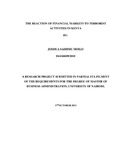| dc.description.abstract | The performance in the financial sector is expressed mainly in terms of the behavior of
the capital markets as express by the changes in stock prices which affect the overall
value of the listed firms. The main indexes used in analyzing the capital market
performance are the NSE 20 share index, the All share index, Market adjusted abnormal
returns and the cumulative average abnormal returns among others. This study therefore
was conducted with the objective to analyze the reaction of the financial market to terror
activities in Kenya as presented by changes in stock prices of the firms listed in NSE. The
study used secondary data from the NSE. over the study period as from 1975 and January
2013.The date of each terror activity was the event date for this study and the focus was
on, the US embassy (1998), Kikambala attack (2002), Uhuru park attack (2010),
Alshabaab attacks on Oct 24th 2011, May 15th 2012, and January 16th 2013. The reaction
of the NSE has been focused as reflected by the movement on the stock prices for the
study period. Data analysis involved preparation of the collected data, coding, editing and
cleaning of data in readiness for processing using SPSS. In the analysis, t-test was used to
determine the significance of the stock movement to the attacks. The study has
established statistically insignificant reaction is observed days prior to attack dates since
the MAAR reaction were all insignificant though negative in most of the attacks. The
statistically not significant results show that the NSE market is a bit efficient and adjust
quickly to the terrorist attacks. The insignificant reaction is continued to be observed
even days after the attack. The analysis of the CAR reveals statistical significance effects
on the days before and after attacks. This indicates that the cumulative abnormal returns
as a result of the attack over the event period is more significant as compared to the daily
market adjusted abnormal returns. It was revealed that a stock can react differently to
different event as well as different event having varying effect on the different stocks.
This study based on the findings recommends that the government takes decisive
measures to prevent and manage the terrorist attack on the country. Investors are
recommended to explore ways of mitigating risks against the terrorist attacks as it is
evidenced that it affects their wealth in the held in securities traded at the NSE. | en |

